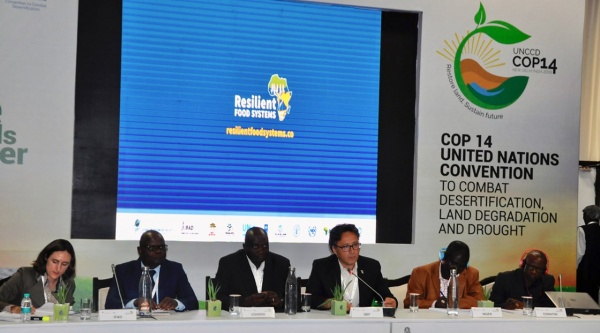
The UNCCD COP14 side event highlighted the innovative approaches of the RFS programme, focusing specifically on the promotion of sustainable natural resource management and the linkages to food and nutrition security outcomes for smallholder farmers.
From 2 to
13 September 2019, the United Nations Convention to Combat Desertification
(UNCCD) held the 14th session
of the Conference of the Parties (COP) at the India Expo Centre and Mart in New
Delhi, India.
Attended by more than 5,000 representatives from over 196 countries, the aim of the conference was to review progress made to control and reverse desertification and land degradation. Over thirty new decisions were adopted surrounding implementation of thematic frameworks on drought, gender, sand and dust storms, desertification, and land degradation.
During the closing plenary, UNCCD Executive Secretary Ibrahim Thiaw highlighted four key messages from COP14:
In parallel to COP14, a side event entitled “Fostering an integrated
approach for sustainable land management in sub-Saharan Africa” was held by
the International Fund for Agricultural Development (IFAD), with support from
the Global Environment Facility (GEF) and in collaboration with other Resilient
Food Systems (RFS) partners, including the World Agroforestry (ICRAF) and RFS
project teams from Eswatini, Niger and Uganda.
The purpose of the side event was to highlight the innovative approaches of the
Resilient Food Systems programme, focusing specifically on the promotion of
sustainable natural resource management and the linkages to food and nutrition
security outcomes for smallholder farmers.
The side event was a really unique opportunity to understand what the GEF programmatic approach is. This programmatic approach is led by IFAD and is a very complicated one, involving 12 countries, several GEF agencies and different executive partners…There is still a lot to do in terms of sustainability and there are still a lot of questions, but Niger, Eswatini, and Uganda are showing a good path.
-Jean-Marc Sinnassamy
Senior Environmental Specialist, GEF Secretariat

Following an overview from IFAD on the Resilient Food Systems initiative, rich case studies from the Sahel, East Africa, and Southern Africa were presented. In particular, project implementors shared experiences on how they are contributing to the three key RFS pillars, by:
Examples of the technical contribution provided by the RFS Regional Hub to the country projects were also discussed, including the collaborative work between Eswatini and ICRAF on the Land Degradation Surveillance Network and the development of a monitoring dashboard that will improve government reporting to UNCCD and other Rio conventions.
We are implementing a land degradation monitoring framework which would indicate the hotspots where we need to focus activities and interventions for meeting the targets that we set for ourselves.
-Mr Bongani Masuku
Principal Secretary, Ministry of Agriculture, Eswatini
With over 100 attendees from several countries, the side event was a great success. The presentation of country challenges and experiences catalysed an exchange of insights, lessons learnt and successful implementation practices with other UNCCD parties.
Additional resources:
Subscribe to our monthly newsletter to receive updates on stories directly from the field across all our projects, upcoming events, new resources, and more.